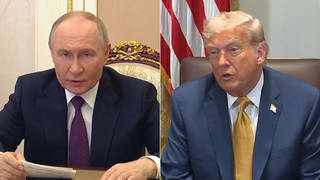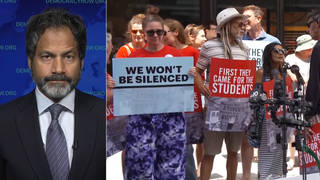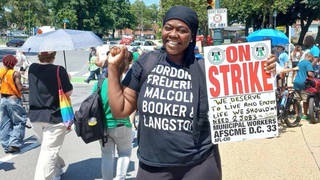
Guests
- Symone Sandersnational press secretary for the Bernie Sanders campaign.
Is the Democratic National Committee trying to undermine the presidential campaign of Vermont Senator Bernie Sanders? That’s the charge Sanders’ team is making amid a dust-up over a breach of voter information. On Friday, the DNC suspended Sanders’ access to a critical database after finding his staffers improperly viewed front-runner Hillary Clinton’s proprietary information when a computer glitch made it briefly available. The DNC backed down after Sanders filed suit, but the Sanders campaign has accused party leadership of trying to thwart the Vermont senator’s bid. This comes as the Sanders campaign says it’s on pace to break President Obama’s record of more than 2.2 million individual donations. Sanders is making history despite being subjected to what he calls a “blackout” in the corporate media. A recent report finds the flagship news programs at major networks NBC, CBS and ABC have dedicated 234 minutes this year to stories about Donald Trump—compared to just 10 minutes for Sanders. We are joined by Symone Sanders, national press secretary for the Bernie Sanders campaign.
Transcript
AMY GOODMAN: Is the Democratic National Committee trying to undermine the presidential campaign of Vermont Senator Bernie Sanders? That’s the charge Sanders’ team is making after a dust-up over a breach of voter information. On Friday, the DNC suspended Sanders’ access to a critical database after finding his staffers had improperly viewed information collected by the campaign of front-runner Hillary Clinton. Several Sanders employees reportedly browsed and downloaded the Clinton campaign’s data after a computer glitch made it briefly available. The DNC responded by blocking Sanders from the voter database, effectively cutting off the campaign’s voter outreach and the source of an estimated $600,000 in donations per day. The DNC backed down after Sanders filed suit. But Sanders campaign manager Jeff Weaver accused party leadership of trying to thwart the Vermont senator’s bid.
JEFF WEAVER: By their action, the leadership of the Democratic National Committee is now actively attempting to undermine our campaign. This is unacceptable. Individual leaders of the DNC can support Hillary Clinton in any way they want, but they are not going to sabotage our campaign, one of the strongest grassroot campaigns in modern history. We are announcing today that if the DNC continues to hold our data hostage and continues to try to attack the heart and soul of our grassroots campaign, we will be in federal court this afternoon seeking immediate relief.
AMY GOODMAN: Though Sanders did win and was able to regain access to the database, he has also criticized the DNC for leaking the story to the media instead of handling the issue internally. Senator Sanders and former Maryland Governor Martin O’Malley have also accused the DNC of trying to help Clinton by limiting the number of debates and scheduling them during low-viewership times like Saturday nights. The Sanders campaign has fired one staffer and suspended two others involved in the data breach. At the Democratic presidential debate Saturday night, Sanders apologized to Clinton but called for an independent probe. Sanders suggested Clinton’s team may have accessed his data at other points during the presidential campaign.
DAVID MUIR: Senator Sanders, you fired a campaign staffer, you have sued the Democratic National Committee—all of this after your campaign acknowledged that some of your staffers, quote, “irresponsibly accessed data from another campaign.” The Clinton campaign called this a very egregious breach of data and ethics, and said, quote, “Our data was stolen.” Did they overstate this, or were your staffers essentially stealing part of the Clinton playbook?
SEN. BERNIE SANDERS: David, let me give you a little bit of background here. The DNC has hired vendors. On two occasions, there were breaches in information. Two months ago, our staff found information on our computers from the Clinton campaign. And when our staffers said, “Whoa, what’s going on here?” they went to the DNC quietly. They went to the vendor and said, “Hey, something is wrong,” and that was quietly dealt with. None of that information was looked at. Our staff at that point did exactly the right thing.
A few days ago, similar incident happened. There was a breach. Because the DNC vendor screwed up, information came to our campaign. In this case, our staff did the wrong thing: They looked at that information. As soon as we learned that they looked at that information, we fired that person. We are now doing an independent internal investigation to see who else was involved.
Thirdly, what I have a really problem with—and as you mentioned, this is a problem; I recognize it as a problem—but what the DNC did, arbitrarily, without discussing it with us, is shut off our access to our own information, crippling our campaign. That is an egregious act. I’m glad that late last night that was resolved.
Fourthly, I work—look forward to working with Secretary Clinton for an investigation, an independent investigation, about all of the breaches that have occurred from day one in this campaign, because I am not convinced that information from our campaign may not have ended up in her campaign. Don’t know that, but we need an independent investigation, and I hope Secretary Clinton will agree with me for the need of that.
Last point. When we saw the breach two months, we didn’t go running to the media and make a big deal about it. And it bothers me very much that rather than working on this issue to resolve it, it has become many press releases from the Clinton campaign later.
AMY GOODMAN: The dispute over voter information comes as the Sanders campaign says it’s on pace to break President Obama’s record for individual donations. Sanders has received over 2 million contributions so far, putting him in position to shatter Obama’s record of 2.2 million. The average donation to Sanders is less than $30.
Sanders is breaking donation records despite being subjected to what he calls a “blackout” in the corporate media. A recent report finds the flagship news programs at major networks—NBC, CBS and ABC—have dedicated 234 minutes this year to stories about Donald Trump, compared to just 10 minutes for Sanders. The Tyndall Report found ABC’s World News Tonight, for example, devoted 81 minutes to Trump campaign stories up 'til the end of November this year—and just 20 seconds to Sanders. This is for the entire year until December. The gap comes despite Trump and Sanders often having similar levels of support in primary polls, and often Sanders having much larger campaign rallies. In a statement, the Sanders campaign said, quote, “The corporately-owned media may not like Bernie's anti-establishment views but for the sake of American democracy they must allow for a fair debate in this presidential campaign.”
Well, we’re joined right now by Symone Sanders, national press secretary for the Bernie Sanders campaign. She’s joining us from Burlington, Vermont. That is the state that Bernie Sanders represents in the Senate.
Symone, thanks for joining us. Start off by talking about the significance of this breach. Your campaign has been shook up. You have a top digital staffer who’s been fired and two others who have been suspended.
SYMONE SANDERS: Thank you for having me this morning. So, yes, it—we were alerted earlier—late last week that a breach had indeed happened, due to a failure by the DNC’s vendor. After discussions with the DNC, it came to our attention that one of our staffers had inappropriately accessed data. That is not acceptable to the Sanders campaign, so that staffer was fired.
Thursday and Friday, we found out Friday that the DNC had shut off our access to our voter database. That was an egregious overreach of the DNC, and that was unacceptable to us. So we stood up, and we’re so happy that 550,000 folks across the country stood with us and signed petitions on Friday asking, and actually demanding, that the DNC restore our access to our voter database. That is a database that millions of people across America have worked to compile. That is a database that our over 2.3 million contributions have paid for. And that was a database that was ours. We are happy that late Friday evening, early Saturday morning, access to our database was restored.
And Senator Sanders, you know, on that debate stage Saturday night, he would—he did great. It was a big night for him. And he came out with boundless energy. He apologized for the issue at hand, on our staffer. And he also apologized to our supporters, because that is not the kind of campaign we’re running. And then he got back to talking about the issues.
AMY GOODMAN: Is your campaign alleging that Hillary Clinton’s campaign may have done the same, taking advantage of this breach in the DNC database?
SYMONE SANDERS: You know, we don’t know. That is why we are calling for an independent investigation of the DNC’s handling of all the campaigns’ data during this campaign season, because there’s no way for us to know without an independent investigation.
AMY GOODMAN: Now, I wanted to ask you about the press coverage. First of all, a lot of people might be surprised today to even know there was a Democratic debate on Saturday night, because these debates are taking place on Saturday night. In fact, the next one, while it’s not Saturday night, it will be Sunday night of the three-day Martin Luther King weekend—huge football weekend, right? That’s going to be January 17th. Who determines when these debates will take place? The Republican debates get massive attention. They’re during the week. Why are these sequestered like this?
SYMONE SANDERS: You know, I’m not sure. That is up to the DNC. The DNC sets the debate schedule. And here we are, coming off the heels of a Saturday night debate this Monday morning. We did—we put out a press release recently talking about the Bernie blackout, if you will. As you noted, a report recently came out that noted that Senator Sanders had only received 10 minutes of coverage from the flagship television newscasts this year, 20 seconds from ABC World News Tonight—just 20 seconds. So, we know that Senator Sanders is attracting thousands and thousands of people to his rallies across the country, more than any other presidential candidate in this race, Republican or Democrat. We know that he has raised millions of dollars. We just—we just announced that we had raised—we have over 2.3 million contributions to our campaign, more than any White House bid in history. Senator Sanders, in Republican match-ups, does better than Secretary Clinton, with Donald Trump and other Republicans in this White House race. He’s snagged endorsements from Communications Workers of America, the Working Families Party, Democracy for America, the National Nurses United, American Postal Workers. But these things are all but ignored by the flagship television newscasts.
AMY GOODMAN: So do you think that you’re being as ignored this week, when you have this issue of the controversy in the glitch—it will certainly turn things around—reporting on Bernie Sanders negatively?
SYMONE SANDERS: Well, I definitely don’t think we were ignored on Friday or Saturday. And it’s unfortunate that it took a, quote-unquote, “fiasco” or “scandal,” if you will, as other folks were reporting it, an issue, for flagship news stations to cover what is definitely a competitive Democratic primary. But, look, despite the fact that some flagship news stations have decided—have essentially locked Senator Sanders out of some of this coverage, the political revolution is rolling on. You know, Senator Sanders’ name ID is going up. In The Des Moines Register/Bloomberg poll that came out last week, Senator Sanders was polling at 39 percent. In that same poll in January of earlier this year, he was at 5 percent. So even without this coverage of these flagship television news stations, Senator Sanders’ support is growing. We are going out, and we’re meeting voters where they are, in communities across the country, not just in Iowa, New Hampshire, South Carolina and Nevada, but in Virginia, in Alabama, in Colorado and all across this country. We are reaching out to folks and asking them to join the political revolution.
AMY GOODMAN: Interestingly, the presidential candidate who gained the most Twitter followers during the Republican debate last week was not one of the Republicans, was not Donald Trump, it was Bernie Sanders. Now, this was right around the time that Bernie Sanders did that interview with Killer Mike, the well-known rapper, hip-hop artist in Atlanta, Georgia, who introduced him at a rally there and also did that barbershop interview with him. Can you talk about the significance of this support, and also Bernie Sanders—something that didn’t get tremendous attention—just a few weeks ago, going to Sandtown, going to Baltimore, to where Freddie Gray was killed, and why he did this, right at the beginning of December?
SYMONE SANDERS: Yes. So, I think it’s important to note that the political revolution is a multiracial political revolution. The political revolution is young people, it’s old people, it’s men and women, gay, straight, white, black, Latino, who are standing up, saying, “Enough is enough.” And America is just not for the billionaires, that we, the everyday, hard-working people, want to be a part of what is happening in our democracy. So, yes, folks like Killer Mike have joined the political revolution. People like Susan Sarandon have joined the political revolution. And I think it’s important, because the senator’s platform, it just goes to show that it speaks to a broad range of people.
Yes, so on December 8th, we visited Baltimore, Maryland, and the senator took a walking tour of the Sandtown-Winchester neighborhood, which is the neighborhood where Freddie Gray lived and where he was arrested. That walking tour was extremely important, because as you walk the streets of that particular neighborhood in Baltimore, you notice that there aren’t things like a grocery store, that there aren’t things such as a bank, of a branch. So, where do folks cash their checks? Where do folks go to get quality groceries? The senator remarked in a meeting with pastors, following that walking tour, that, you know, people don’t understand, but it’s very expensive to be poor. And that visit to Baltimore not only shined a light on communities across the country that deal with these exact same things, but it also brought up issues of education. We talked about issues of economic inequality. We talked about historically black colleges and universities. We discussed these issues with African-American civic leaders and religious leaders from across the country. It was a very rich and fruitful conversation for both sides. And I think it was an—it was an amazing visit.
AMY GOODMAN: Symone Sanders, I want to thank you for being with us, national press secretary for the Bernie Sanders campaign, speaking to us from Burlington, Vermont. This is Democracy Now! When we come back, we go back to clips of the debate on Saturday night and speak with Phyllis Bennis and Bill Curry. This is Democracy Now! Back in a minute.













Media Options